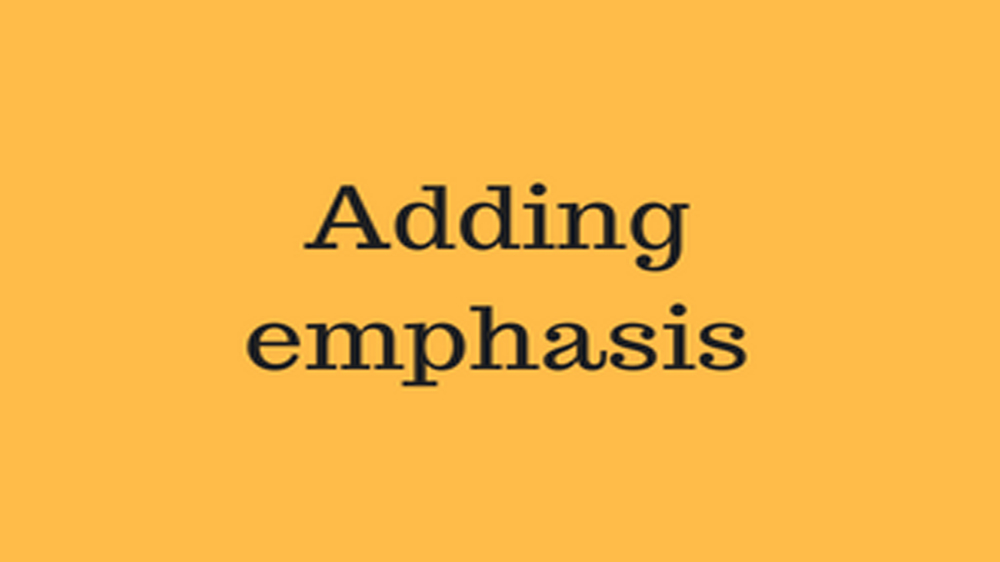جملات انگلیسی برای نحوه تأکید کردن Adding Emphasis, به یک جمله مثبت do, did اضافه میشود. جمله مثبت انگلیسی, زمان حال ساده یا گذشته است. do,did برای نحوه تأکید کردن Adding Emphasis قبل از فرم ابتدایی فعل قرار میگیرند.
آموزش زبان انگلیسی را اینجا دنبال کنید.

نویسنده: American-English File
مترجم: رؤیا کریمی جنابی
تأکید بیشتر (1): وارونه سازی
Adding Emphasis (1): Inversion
1. Not only is my brother lazy, (but) he's also very selfish.
Not until you can behave like an adult will we treat you like an adult.
Never have I heard such a ridiculous argument.
No sooner had the football gave started than it began to snow heavily.
2. Not only did you forget to shut the window, (but) you also forgot to lock the door!
Not until you become a parent yourself do you understand what it really means.
3. The train began to move. Only then was I able to relax.
Only when you leave home do you realize how expensive everything is.
Hardly had I sat down when the train began to move.
Rarely have I met a more irritating person.
در انگلیسی رسمی، خصوصاً در نوشتار، بعضی اوقات ترتیب معمول کلمات را تغییر میدهیم. در اینصورت جملات را تأکیدیتر و یا تأثیرگذارتر کنیم.
1. این ساختار معمولاً با عبارات قیدی منفی نظیر Not only…, Not until…, Never…, و No sooner… than (که نحوه بیان رسمی as soon as است) دیده میشود.
- وقتی از ساختار وارونه سازی پس از عبارات بالا استفاده میکنیم. درواقع جای فاعل و فعل (کمکی) را عوض میکنیم:
NOT Not only my brother is lazy
- جملات زیر را با هم مقایسه کنید، در جملهی اول، ترتیب جمله عادی است. اما در جملهی دوم از وارونه سازی استفاده شده است برای آن که جمله تأکیدیتر باشد:
My brother is not only lazy, but he's also very selfish. (= normal word order)
Not only is my brother lazy, but he's also very selfish. (= inversion to make the sentence more emphatic)
2. در زمان حال ساده و گذشته ساده، علاوه بر عوض کردن جای فعل و فاعل از do/ does/ did+ subject+ main verb استفاده میکنیم:
NOT Not only forgot you to shut the window…
3. از وارونه سازی پس از این عبارات هم استفاده میکنیم:
Only then…, Only when…, Hardly/ Scarcely…when, and Rarely…
فقط زمانی که میخواهیم جملهی ما تأثیر گذارتر باشد باید از وارونه سازی استفاده کنیم. چون استفاده بیش از حد از آن سبب میشود که انگلیسی شما غیرمعمول به نظر برسد.
ترجمه شده از 5 American-English File Student Book
تأکید بیشتر (2): جملات دو تکه
Adding Emphasis (2): Cleft Sentences
هنگامی که میخواهیم توجه خود را روی چیزی متمرکز کنیم یا میخواهیم روی بخشی از یک جمله تأکید داشته باشیم. میتوانیم این کار را با اضافه کردن برخی کلمات یا عبارات به ابتدای آن انجام دهیم. بعضی اوقات به این جملات، جملات دو تکه (Cleft Sentences) میگوییم.
More Emphatic Sentences
| 1- Beginning with what or All |
|
What I need is a coffee.
What I don't like here is the weather.
All I want is to travel.
All I did was touch it.
|
I need a coffee.
I don't like the weather here.
I just want to travel.
I only touched it!
|
| 2- Beginning with what happens is…/ what happened was… |
|
What happens is (that) you take a test and then you have an interview.
What happened was (that) we left our passports at home.
|
You take a test and then you have an interview.
We left our passports at home.
|
| 3- Beginning with The person who…, The place where…, The first/ last time…, The reason why…, etc. |
|
The person (who/ that) I spoke to was the manager.
The place where we stayed was a five- star hotel.
The last time I saw him was on Saturday.
The reason (why/ that) I bought it was that/ because it was cheap.
|
I spoke to the manager.
We stayed in a five- star hotel.
I last saw him on Saturday.
I bought it because it was cheap.
|
| 4- Beginning with It |
|
It was a boy in my class who won the prize.
It was last Friday when we had the meeting.
It was the bread (that) they charged us extra for.
|
A boy in my class won the prize.
We had the meeting last Friday.
They charged us extra for the bread.
|
1. میتوانیم روی برخی جملات تأکید داشته باشیم با آوردن ساختار زیر و پس از آن قسمتی از جمله را بیاوریم که میخواهیم مورد تأکید قرار دهیم:
What (= the thing)/ All(= the only thing)+ clause+ be+…
2. برای تأکید روی یک اتفاق یا مجموعهای از اتفاقات، میتوانیم جمله را با این کلمات شروع کنیم:
What happens is (that)…What happened was (that)…
3. میتوانیم بخشی از جمله را مورد تأکید بیشتری قرار دهیم با آغاز کردن جمله با ساختاری مثل ساختار زیر و پس از آن هم قسمتی از جمله را بیاوریم که میخواهیم مورد تأکید قرار دهیم:
The person who…, the place where…, the first/ last time that…, the reason why…, etc.+ clause+ be+ …
4. میتوانیم از این ساختار هم استفاده کنیم:
It is/ was+ the emphasized part of the sentence+ a relative clause.
اگر قسمت تأکید شده، یک ضمیر باشد معمولاً از بعد از It is/ was از ضمیر مفعولی استفاده میکنیم:
It was me who paid the bill.
NOT it was I who paid the bill.
ترجمه شده از 5 American-English File Student Book